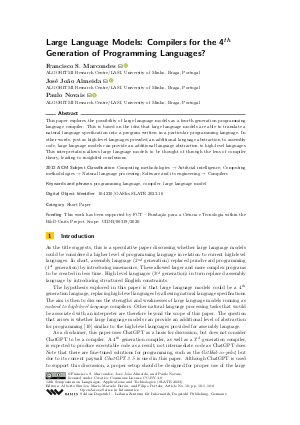Large Language Models: Compilers for the 4^{th} Generation of Programming Languages? (Short Paper)
Authors
Francisco S. Marcondes  ,
José João Almeida
,
José João Almeida  ,
Paulo Novais
,
Paulo Novais 
-
Part of:
Volume:
12th Symposium on Languages, Applications and Technologies (SLATE 2023)
Part of: Series: Open Access Series in Informatics (OASIcs)
Part of: Conference: Symposium on Languages, Applications and Technologies (SLATE) - License:
 Creative Commons Attribution 4.0 International license
Creative Commons Attribution 4.0 International license
- Publication Date: 2023-08-15
File

PDF
OASIcs.SLATE.2023.10.pdf
- Filesize: 0.8 MB
- 8 pages
Document Identifiers
Subject Classification
ACM Subject Classification
- Computing methodologies → Artificial intelligence
- Computing methodologies → Natural language processing
- Software and its engineering → Compilers
Keywords
- programming language
- compiler
- large language model
Metrics
- Access Statistics
-
Total Accesses (updated on a weekly basis)
0Document
0Metadata
Abstract
This paper explores the possibility of large language models as a fourth generation programming language compiler. This is based on the idea that large language models are able to translate a natural language specification into a program written in a particular programming language. In other words, just as high-level languages provided an additional language abstraction to assembly code, large language models can provide an additional language abstraction to high-level languages. This interpretation allows large language models to be thought of through the lens of compiler theory, leading to insightful conclusions.
Cite As Get BibTex
Francisco S. Marcondes, José João Almeida, and Paulo Novais. Large Language Models: Compilers for the 4^{th} Generation of Programming Languages? (Short Paper). In 12th Symposium on Languages, Applications and Technologies (SLATE 2023). Open Access Series in Informatics (OASIcs), Volume 113, pp. 10:1-10:8, Schloss Dagstuhl – Leibniz-Zentrum für Informatik (2023)
https://doi.org/10.4230/OASIcs.SLATE.2023.10
BibTex
@InProceedings{s.marcondes_et_al:OASIcs.SLATE.2023.10,
author = {S. Marcondes, Francisco and Almeida, Jos\'{e} Jo\~{a}o and Novais, Paulo},
title = {{Large Language Models: Compilers for the 4^\{th\} Generation of Programming Languages?}},
booktitle = {12th Symposium on Languages, Applications and Technologies (SLATE 2023)},
pages = {10:1--10:8},
series = {Open Access Series in Informatics (OASIcs)},
ISBN = {978-3-95977-291-4},
ISSN = {2190-6807},
year = {2023},
volume = {113},
editor = {Sim\~{o}es, Alberto and Ber\'{o}n, Mario Marcelo and Portela, Filipe},
publisher = {Schloss Dagstuhl -- Leibniz-Zentrum f{\"u}r Informatik},
address = {Dagstuhl, Germany},
URL = {https://drops.dagstuhl.de/entities/document/10.4230/OASIcs.SLATE.2023.10},
URN = {urn:nbn:de:0030-drops-185240},
doi = {10.4230/OASIcs.SLATE.2023.10},
annote = {Keywords: programming language, compiler, large language model}
}
Author Details
Funding
This work has been supported by FCT – Fundação para a Ciência e Tecnologia within the R&D Units Project Scope: UIDB/00319/2020.
References
-
Alfred V Aho, Monica S Lam, Ravi Sethi, and Jeffrey D Ullman. Compilers: principles, techniques and tools. Pearson, 2020.

-
Tom Brown, Benjamin Mann, Nick Ryder, Melanie Subbiah, Jared D Kaplan, Prafulla Dhariwal, Arvind Neelakantan, Pranav Shyam, Girish Sastry, Amanda Askell, et al. Language models are few-shot learners. Advances in neural information processing systems, 33, 2020.

-
Robert B Grady and Deborah L Caswell. Software metrics: establishing a company-wide program. Prentice-Hall, Inc., 1987.

-
Ivar Jacobson, Ian Spence, and Brian Kerr. Use-case 2.0. Queue, 14(1):94-123, 2016.

-
Dan Jurafsky and James H. Martin. Speech and Language Processing. draft (https://web.stanford.edu/~jurafsky/slp3/), third edition, 2023.

-
Donald Ervin Knuth. Literate programming. The computer journal, 27(2):97-111, 1984.

-
Philippe B Kruchten. The 4+ 1 view model of architecture. IEEE software, 12(6):42-50, 1995.

-
Chris Raistrick, Paul Francis, John Wright, Colin Carter, and Ian Wilkie. Model driven architecture with executable UML, volume 1. Cambridge University Press, 2004.

- Elvis Saravia. Prompt engineering guide, 2023. URL: https://www.promptingguide.ai/.
-
Robert W Sebesta. Concepts of programming languages. Pearson Education, 2019.

-
J.F. Smart and J. Molak. BDD in Action, Second Edition: Behavior-Driven Development for the Whole Software Lifecycle. Manning, 2023.

-
Bernhard Thalheim and Hannu Jaakkola. Model-based fifth generation programming. Information Modelling and Knowledge Bases, 31:381-400, 2020.

-
Ashish Vaswani, Noam Shazeer, Niki Parmar, Jakob Uszkoreit, Llion Jones, Aidan N Gomez, Łukasz Kaiser, and Illia Polosukhin. Attention is all you need. Advances in neural information processing systems, 30, 2017.

-
Karl Wiegers. More about software requirements. Microsoft Press, 2005.

-
Zhuosheng Zhang, Aston Zhang, Mu Li, Hai Zhao, George Karypis, and Alex Smola. Multimodal chain-of-thought reasoning in language models. arXiv:2302.00923, 2023.

-
Wayne Xin Zhao, Kun Zhou, Junyi Li, Tianyi Tang, Xiaolei Wang, Yupeng Hou, Yingqian Min, Beichen Zhang, Junjie Zhang, Zican Dong, et al. A survey of large language models. arXiv preprint arXiv:2303.18223, 2023.

-
Majd Zohri Yafi. A Syntactical Reverse Engineering Approach to Fourth Generation Programming Languages Using Formal Methods. PhD thesis, University of Essex, 2022.

